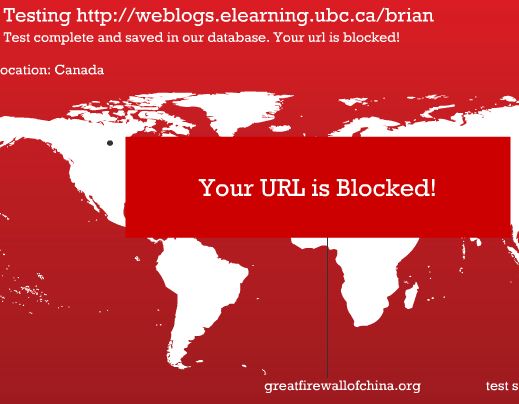It might as well be a Monday morning ritual — I have to apologise to my housemates and houseguests for my boorish behaviour the previous Friday night. Everyone else had gone to bed, I was reviewing the many awesome entries for the online learning video festival, and between my heavy feet, my clumsy snack preparation, and my many whoops, giggles and groans I apparently made quite a racket.
I also had lots of late-night fun firing URLs into the Great Firewall of China site, which tests whether sites are safe for Chinese consumption. Like all censorship regimes, the logic of what is acceptable and what is not is tough to fathom. From what I can determine, all WordPress.com sites are blocked, whereas blogger.com and most blogspot.com blogs get through fine (perhaps Automattic should cut a Google deal, or help round up dissidents like Yahoo does). The most innocuous Wikipedia articles don’t seem to make it through, at least not in English.
The first URL I tested was my own of course, and I’m too hot for Beijing (see image above). I wondered if it was the weblogs.elearning.ubc.ca domain, but I tested the root URL and numerous other blogs we host (including ones with fairly pointed political commentary) and mine was the only one on the redlist.
What could I have done to merit such recognition? Perhaps some cog in the machine thought posts like this one or this one were impolite. Then again, maybe they’re trying to keep their information ecosystems clear of trash — and who could blame them?
It might also be that http://irrepressible.info/ widget from Amnesty International I slapped on my sidebar last week. I had been wavering on whether the payoff was worth dragging down my site load time with yet another chunk of javascript… I’m more likely to keep it there now.
Postscript: according to a comment on Alan’s blog, there’s at least one school district in North America blocking access to greatfirewallofchina.org. Repressive minds think alike.



I think the Chinese gigantic proxy server has a quite complex code base behind it. One thing for sure is that it does not only detect “sensitive” words from a site but also checks who is linking to the site and where the site is linking out to. It also checks on what other contents is on the root server. Say your site is hosted on the same server with a already blocked site, it’s likely they will block the contents from your site as well. The content blocking is not consistent either. There are quite few ways to get around it, using UBC VPN is one way… Anyway, I better shut up before they block mine too. 🙂